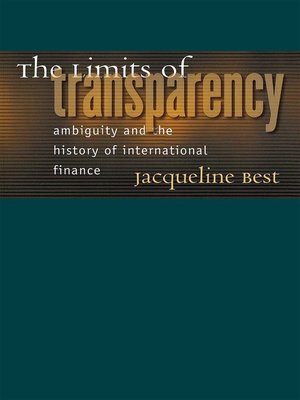The Limits of Transparency
ebook ∣ Ambiguity and the History of International Finance · Cornell Studies in Money
By Jacqueline Best

Sign up to save your library
With an OverDrive account, you can save your favorite libraries for at-a-glance information about availability. Find out more about OverDrive accounts.
Find this title in Libby, the library reading app by OverDrive.



Search for a digital library with this title
Title found at these libraries:
| Library Name | Distance |
|---|---|
| Loading... |
A decade of crises has reminded us of the fragility of the international financial system. Conventional wisdom holds that uncertainty is the basic problem of financial governance, and attempts to contain ambiguity have dominated recent financial reform efforts. Jacqueline Best, however, contends that ambiguity can play a valuable role in international political and economic stability. The stability of the postwar era depended, Best suggests, on a carefully maintained balance between coherence and ambiguity. In her view, the collapse of the Bretton Woods exchange-rate regime was caused in large part by the increasing rigidity of the system and its corresponding inability to accommodate ambiguity.
This is a novel argument in an area much discussed by economists and political scientists. Their debate has focused on uncertainty as a technical problem and transparency as the solution. Although such policies are presented as technical, Best demonstrates that they are also political, have cultural consequences, and may prove counterproductive. Rather than assume that transparency is the ultimate goal, Best argues, we must recognize that ambiguity is pervasive, substantive, and potentially constructive. To read this book is to comprehend more deeply the ways in which politics is fundamental to economic theory and practice and to understand why the economy requires political leadership in order to flourish.







